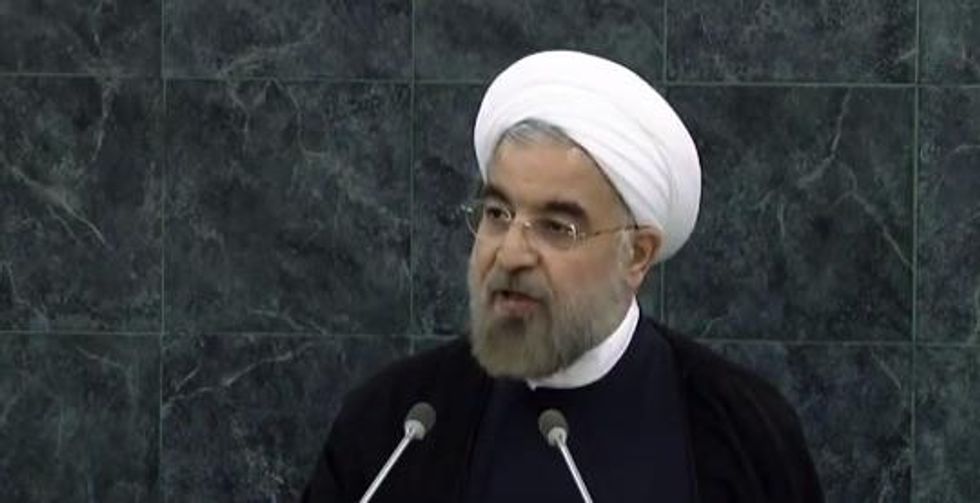People "are tired of war," Iran's President Rouhani said as he addressed the United Nations General Assembly on Tuesday in a speech in which he also railed against drones,
sanctions and U.S. "warmongering."
In his address, the new president repeated his message that Iran's nuclear program is for "exclusively peaceful purposes," and said that his country was "prepared to engage immediately in time-bound and result-oriented" negotiations over its nuclear program.
Rouhani said:
The human society should be elevated from a state of mere tolerance to that of collective collaboration. We should not just tolerate others. We should rise above mere tolerance and dare to work together.
People all over the world are tired of war, violence and extremism. They hope for a change in the status quo. And this is a unique opportunity - for us all. The Islamic Republic of Iran believes that all challenges can be managed - successfully - through a smart, judicious blend of hope and moderation. Warmongers are bent on extinguishing all hope. But hope for change for the better is an innate, religious, widespread, and universal concept.
Rouhani also called out the use of drones in the war on terror. He condemned terrorism as the "ultimate inhumanity of extremism and violence," calling it a "violent scourge" that "knows no country or national borders."
"But," he continued, "the violence and extreme actions such as the use of drones against innocent people in the name of combating terrorism should also be condemned."
Rouhani also condemned the U.S.-led sanctions and compared those against Iran to those against Saddam Hussein's Iraq. Rouhani said sanctions are
...intrinsically inhumane and against peace. And contrary to the claims of those who pursue and impose them, it is not the states and the political elite that are targeted, but rather, it is the common people who are victimized by these sanctions. Let us not forget millions of Iraqis who, as a result of sanctions covered in international legal jargon, suffered and lost their lives, and many more who continue to suffer all through their lives. These sanctions are violent, pure and simple; whether called smart or otherwise, unilateral or multilateral. These sanctions violate inalienable human rights, inter alia, the right to peace, fight to development, right to access to health and education, and above all, the right to life.
Describing the effects of the sanctions on people in Iran, Narges Bajoghli, NYU doctoral student and filmmaker of the documentary "The Skin That Burns," told Democracy Now! on Wednesday:
The biggest thing that we are seeing in Iran right now is that medicine, vital medicine, especially for those who are dealing with chronic diseases and cancer, is no longer available. Survivors of chemical warfare, which we have, in Iran, about 100,000 survivors of chemical warfare, don't have access to the vital medicine that they need, and anything from birth control pills to any sort of even over-the-counter stuff like anything that has to deal with women's health, or anything like that, is extremely hard to come by today in Iran. Beyond the pharmaceuticals, also the price of meat and the price of everyday staple food has gone up at least six to seven times in the past about six, seven months.
Rouhani also used his speech to criticize the oft-repeated portrayal of an "Iranian threat:"
This propagandistic discourse has assumed dangerous proportions through portrayal and inculcation of presumed imaginary threats. One such imaginary threat is the so-called "Iranian threat" - which has been employed as an excuse to justify a long catalogue of crimes and catastrophic practices over the past three decades. The arming of the Saddam Hussein regime with chemical weapons and supporting the Taliban and A1-Qaida are just two examples of such catastrophes. Let me say this in all sincerity before this august world assembly, that based on irrefutable evidence, those who harp on the so-called threat of Iran are either a threat against international peace and security themselves or promote such a threat. Iran poses absolutely no threat to the world or the region.
Israel, who consistently warns of such an "Iranian threat," boycotted Rouhani's speech at the General Assembly, while Israel's Prime Minister Benjamin Netanyahu issued a statement on Wednesday saying it "was a cynical speech that was full of hypocrisy" and that it is "Iran's strategy - to talk and play for time in order to advance its ability to achieve nuclear weapons."
President Obama and Rouhani did not meet on the sidelines of the UN event, as some had speculated could happen. The Guardian reports that
There had been speculation that the pair would meet on the fringes of the United Nations general assembly in New York, in what would have been the first such encounter since the Islamic revolution toppled the shah of Iran in 1979.
But Obama administration officials said that while the US offered a meeting, the Iranian delegation turned it down, saying it was "too complicated".
Officials from the two countries have been discussing the logistics of an "encounter" in the UN complex in mid-town Manhattan for several days, a UN official confirmed to the press pool travelling with Obama. In the end though, the official said, it was "too complicated for Iranians to do at this point".
However, talks between U.S. Secretary of State John Kerry and Iran's Foreign Minister Mohammad Javad Zarif are scheduled for Thursday, "the highest-level substantive meeting since the countries severed diplomatic ties following Iran's Islamic revolution in 1979."
The possibility of improved relations between the U.S. and Iran has reportedly left Israel "rattled," and Netanyahu has dismissed Rouhani's recent outreach to Western media as a mere "charm offensive."
* * *
You can watch Rouhani's address below:
____________________



